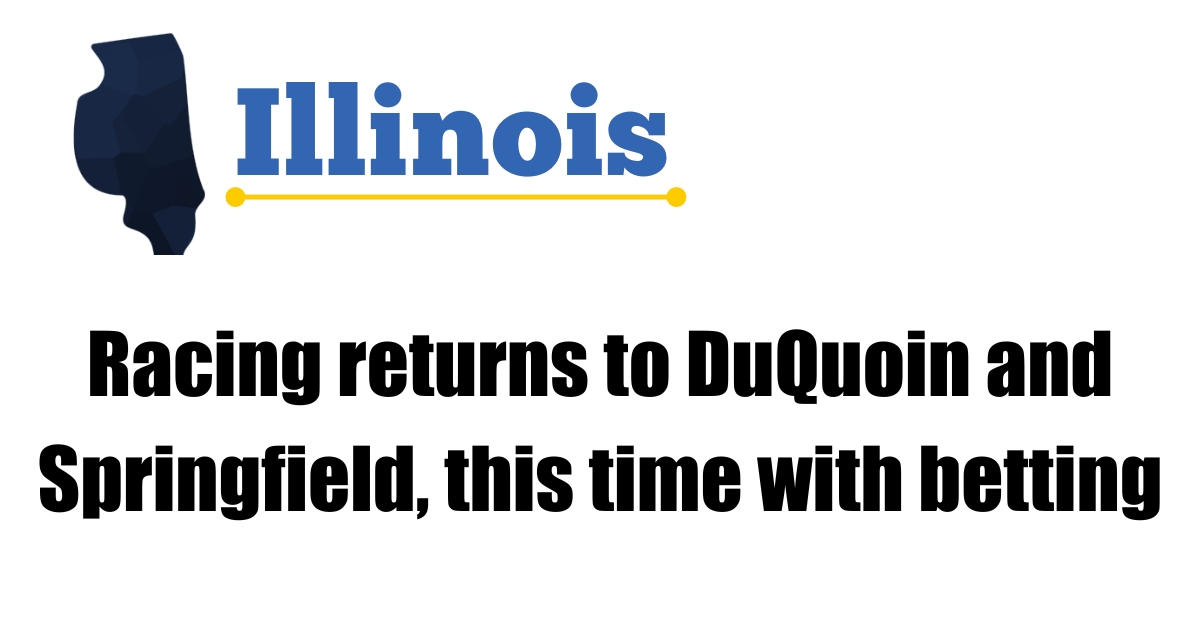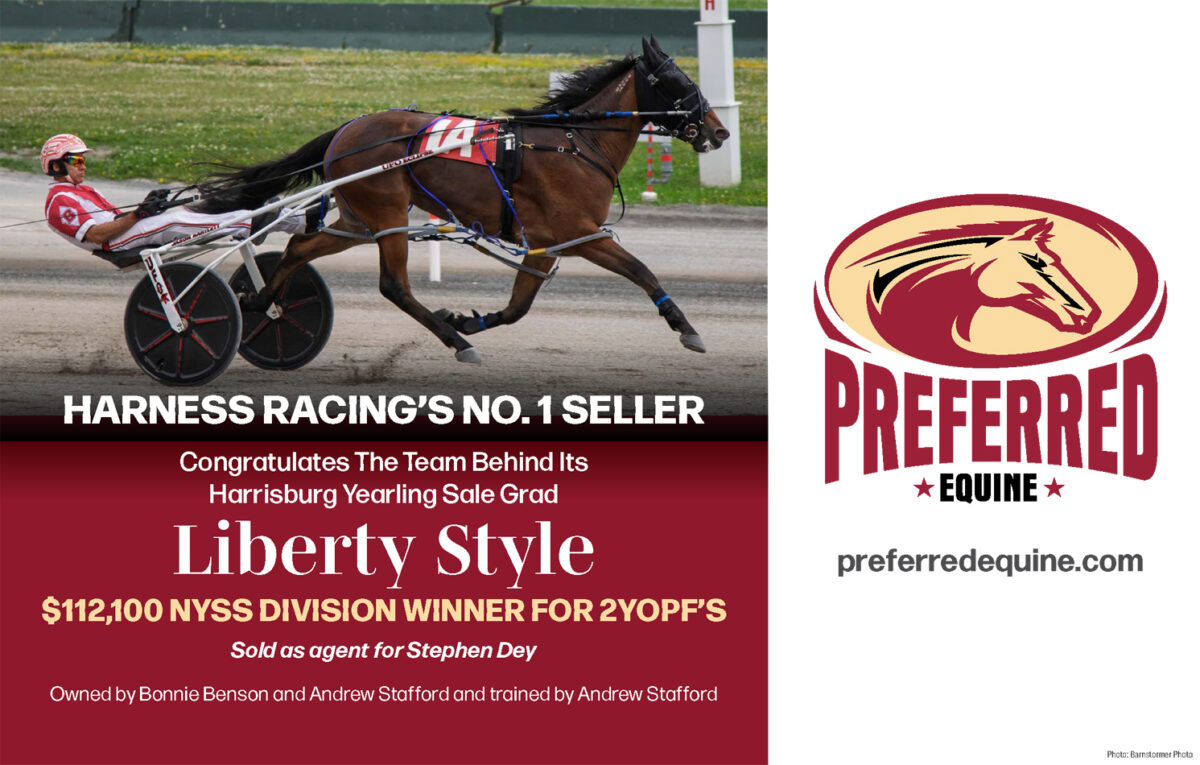Racing returns to DuQuoin and Springfield, this time with betting
by Neil Milbert
For the first time since February, pari-mutuel harness racing will briefly return to Illinois this month when the annual mini-meetings for Illinois-breds are held at the State Fairs in Springfield and DuQuoin.
There will be 11 a.m. and 5 p.m. programs at Springfield on Thursday (Aug. 8) and programs starting at 11 a.m. on Aug. 9, 10, 14 and 15. The DuQuoin races will be held from Aug. 26 through Aug. 28 starting at 4 p.m.
All of the races also will be simulcast for betting at Hawthorne Race Course, Illinois off-track betting sites, out-of-state network locations and Internet and phone betting outlets.
After the State Fairs end, there won’t be any pari-mutuel betting in Illinois until Hawthorne begins an Oct. 19-Dec. 30 meeting.
However, the non-betting races at Springfield and DuQuoin that were held in June and July will resume in September and continue into early October. These races are funded by the Hawthorne purse account, whereas the Illinois Department of Agriculture is picking up the tab for the nine pari-mutuel programs at the two State Fairs.
“Next Monday and Tuesday are our [pari-mutuel] rain dates at Springfield, and maybe that Friday,” said Tim Norman, the Department of Agriculture bureau chief who oversees racing at the state and county fairs.
“At DuQuoin we have the Thursday [Aug. 29 rain date]. If we have to, we could double the number of races to accommodate everything and move up the starting time.”
Racing becomes iffy at both State Fairgrounds if there is heavy rain.
“Last year we could only do one of the five days at Springfield and we had to use Hawthorne to make up the races we lost,” Norman said.
There will be 17 races during the first half of Thursday’s double-header at Hawthorne, 12 for pacers and five for trotters. All are for 2- and 3-year-olds. There are 125 horses entered. Purses range from $2,500 to $7,500 and total $60,000. Field sizes range from four for a trotting race for 2-year-old fillies to 10 for a race for 3-year-old male trotters.
Heading the list of drivers are Marcus Miller, Casey Leonard, Kyle Wilfong and Kyle Husted.
“It’s much more exciting,” said Tony Somone, executive director of the Illinois Harness Horsemen’s Association, contrasting the pari-mutuel races at the State Fairgrounds with the non-betting races at the same locations. “The races are a draw for the State Fairs; we still get good crowds.
“When we talk about these things I think about what a resilient bunch our Illinois harness horsemen are. The circumstances aren’t good and our racing has fallen so far but they keep on going to work and they keep on plugging away.
“They go out there and buy babies and race babies. This is where you can get back part of your investment. And this is the beginning of the dream of so many owners to someday have that big horse.”
Illinois once was one of the leaders of North American racing. During its heyday it played host to the Hambletonian at DuQuoin and then its successor, the World Trotting Derby. Some of the best horses in the U.S. and Canada came for the American-National races at Sportsman’s Park and later Balmoral Park and major races at Maywood Park.
But now the stakes races all are for Illinois-breds and the million-dollar bonuses some offered seem like ancient mythology.
One of the major reason Illinois racing is in shambles is because of the decision by corporate owner Churchill Downs, Inc. (CDI) to shut down the tradition-rich and palatial thoroughbred track Arlington International Racecourse at the end of its 2021 meeting. The decision obviously was made to wipe out gambling competition for the state’s most prosperous casino, the nearby Rivers Casino in Des Plaines, in which CDI in 2018 acquired a 62 per cent interest.
The Arlington property was sold to the Chicago Bears with the stipulation that there be neither horse racing nor casino gambling and to lower its real estate tax bill the National Football League team tore down what Architectural Digest called “the world’s most beautiful racetrack.”
Casino gambling at Illinois racetracks was legalized in 2019 but after lobbying for a racino for many years CDI decided it would be more profitable to abandon racing at Arlington and reject a racino, leaving dual-purpose Hawthorne as the only track in the Chicago metropolitan and one of only two in Illinois. The other is Fairmount Park, a thoroughbred track across the Mississippi River from St. Louis.
Starting in 2022 the standardbreds and thoroughbreds have had to time-share at Hawthorne. Last year’s Sept. 9-Dec. 31 meeting was extended into mid-February and then in March the thoroughbreds took over the track for a meeting that will run until mid-October.
The 2019 legislation legalizing casinos at racetracks was looked upon as a godsend by members of the Illinois Harness Horsemen’s Association and the Illinois Thoroughbred Horsemen’s Association because a portion of the revenue was to be earmarked for purses, thereby significantly increasing the quality of racing.
Sadly, five years later Arlington is no longer in existence and Hawthorne’s proposed $400 million racino is in limbo.
Hawthorne’s grandstand and clubhouse were partially torn down in 2020 but reconstruction has been stalled by the track’s inability to obtain financing. In May, the Chicago Tribune reported that liens for demolition work totaling in excess of $5 million have been filed against either Hawthorne or its owners, Carey Heirs Properties LLC.
In response to the article Hawthorne president Tim Carey said in a statement that his track, “is in the advanced execution phase of a $400 million financing with an investor.”
But there have been no subsequent updates.

















